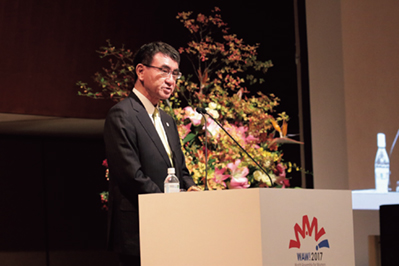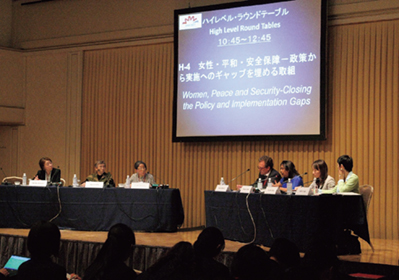(5) Promotion of Women's Empowerment and Participation
Generally, conventional wisdom and social systems in developing countries are often shaped based on men's perceptions, making women prone to vulnerable situations. Compared to the early 2000s when the MDGs were established, the school enrollment rate for girls has improved considerably, women's political participation rate has increased, and more women hold senior official and ministerial posts in the government.(Note 18) However, there are still many countries where women continue to lack the same opportunities as men to participate in decision-making processes, which are not only restricted to high-level government decision-making but also include family and other private decision-making processes that affect the lives of women.
Women are critical actors of development, and their participation will lead not only to the improvement of their own lives, but also to more effective development. For example, improving the ability to read and write for women who have had little or no educational opportunities can improve their access to correct information about public health and prevention of infectious diseases such as HIV/AIDS, and, can lead to appropriate family planning. This, in turn, can promote women's social advancement and economic empowerment.
In the “2030 Agenda,” it is strongly and clearly expressed that “Realizing gender equality and the empowerment of women and girls will make a crucial contribution to progress across all the Goals and targets.” Moreover, Goal 5 of the SDGs seeks to “Achieve gender equality and empower all women and girls.” Gender equality and promoting women's empowerment are essential for realizing “quality growth.” For this purpose, it is important for men and women to participate equally in all phases of development cooperation and to reap the benefits equally.
<Japan's Efforts>
With a determination that the 21st century should be a world with no human rights violations against women, Japan has been playing a leading role in the international community to promote gender mainstreaming and women's empowerment and to build “a society where women shine” around the world by setting the following three as priority fields: (i) promotion of women and girls' rights; (ii) improving an enabling environment for women and girls to reach their full potentials, and (iii) advancing women's leadership in political, economic and other public fields.
At the G7 Taormina Summit held in May 2017, the G7 leaders took a firm stand in the Leaders' Declaration for the mainstreaming of gender equality in various policies, and adopted the “G7 Roadmap for a Gender-Responsive Economic Environment.” The main goals established under this Roadmap are: increasing women's participation and promoting equal opportunities and fair selection processes, strengthening the foundation of women's access to decent and quality jobs, and eliminating violence against women and girls throughout their lives. In November the same year, the first Ministerial Meeting on Gender Equality to be held under the framework of the G7 was convened in Taormina. At this Meeting, Ministers exchanged views about various issues related to gender equality and women's empowerment in the international community, and issued in the Declaration of the Ministers from the G7 Ministerial Meeting on Gender Equality.
In July 2017, “Women Entrepreneurs Finance Initiative (We-Fi)”* was launched and announced at the G20 Summit in Hamburg. This is an important initiative that aims to help women in developing countries make their own living and to promote their active involvement and contribution to society, and Japan expressed its strong support to evidence its intention by providing $50 million towards the initiative.

Foreign Minister Taro Kono delivering a speech at WAW! 2017, held in Tokyo in November 2017

High-level Round Table session on the second day of WAW! 2017, held in Tokyo in November 2017
In September 2017, Prime Minister Abe attended the UN Women HeForShe(Note 19) IMPACT Report presentation. At the event, he introduced Japan's efforts towards the realization of “a society where women shine” and the outcomes of these efforts, as well as the 4th World Assembly for Woman (WAW!) 2017 held in Tokyo in November, and he also called on HeForShe supporters to connect through WAW! and work together towards the realization of “a society where women shine” across the world.
At the WAW! 2017 event held in November 2017, participants engaged in a wide range of discussions based on the following themes: support for female entrepreneurs; effort to achieve SDGs for gender mainstreaming in enterprises; technology transformation and the women's capacity building; how to redistribute unpaid work; women, peace and security; women in media; the future of women's empowerment from the youth perspective; gender equality and promoting resilience to natural hazards. Japan provides support through the United Nations Entity for Gender Equality and the Empowerment of Women (UN Women), offering contributions of approximately $30 million in FY2016 which contributed to efforts in areas such as participation of women in politics, economic empowerment, eradication of violence towards women and girls based on sex and gender, strengthening of women's role in peace and security, and strengthening greater consideration to gender in policies and budgets. For example, Japan has implemented financial training and capacity building to help raise incomes, such as business plan seminars for more than 1,000 women and girls in Cote d'lvoire. In order to prevent rampant spread of violent extremism in Cote d'lvoire, which has experienced instability and military crises over the last 10 years, Japan contributed to the economic empowerment of the community as a whole by creating employment, promoting revenue-generating activities, and enhancing capacity of women and girls, as well as promoted dialogue within the community and awareness raising through education.
Japan considers sexual violence in conflict cannot be tolerated. In this regards, Japan attaches importance on collaboration with the UN Office of the Special Representative of the Secretary-General on Sexual Violence in Conflict (SRSG-SVC). In FT2016, Japan supported $1 million to SRSG-SVC to implement projects in Syria, Jordan and Somalia to enhance prevention and response capacity to sexual violence through the projects which focused on strengthening access to the legal system and corroboration with community leaders.
Furthermore, in order to realize a peaceful society more effectively, it is vital to integrate a gender perspective and to secure women's participation in all levels of conflict prevention, conflict resolution and peace-building. Therefore Japan formulated its National Action Plan on Women, Peace and Security to implement United Nations Security Council resolution 1325 and other relevant resolutions. The National Action Plan has been effective from FY2016 and its annual review report was published end of FY2016.
Japan will continue to cooperate with other countries to address the diversifying development issues by these efforts for achieving empowerment of all women and girls, gender equality, and building a society and system in which men and women support each other.
- *Women Entrepreneurs Finance Initiative (We-Fi)
- Women Entrepreneurs Finance Initiative (We-Fi) is an initiative launched by the World Bank with 14 participating countries, aiming to support for the economic independence of women in developing countries and promoting their social and economic participation, by implementing support to overcome the challenges which women entrepreneurs and women-led SMEs in such countries face such as financing access, legal systems, and others. We-Fi provides financial access assistance to women entrepreneurs, advisory service to facilitate greater business with women entrepreneurs and technical assistance to improve legal and regulatory systems of developing countries. The initiative aims to make more than $1 billion of financing available, with approximately $340 million from donor countries and additional resources from the private-sector and international financial institutions.
- Note 18: Source: The Millennium Development Goals Report 2015
- Note 19: Organized by UN Women, HeForShe is a gender equality campaign that calls for the involvement of men and boys in gender equality.
